| Srl | Item |
| 1 |
ID:
149679
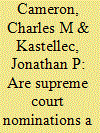

|
|
|
|
|
| Summary/Abstract |
We conduct a theoretical and empirical re-evaluation of move-the-median (MTM) models of Supreme Court nominations—the one theory of appointment politics that connects presidential selection and senatorial confirmation decisions. We develop a theoretical framework that encompasses the major extant models, formalizing the tradeoff between concerns about the location of the new median justice versus concerns about the ideology of the nominee herself. We then use advances in measurement and scaling to place presidents, senators, justices, and nominees on the same scale, allowing us to test predictions that hold across all model variants. We find very little support for MTM theory. Senators have been much more accommodating of the president’s nominees than MTM theory would suggest—many have been confirmed when the theory predicted they should have been rejected. These errors have been consequential: presidents have selected many nominees who are much more extreme than MTM theory would predict. These results raise serious questions about the adequacy of MTM theory for explaining confirmation politics and have important implications for assessing the ideological composition of the Court.
|
|
|
|
|
|
|
|
|
|
|
|
|
|
|
|
| 2 |
ID:
113657
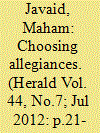

|
|
|
| 3 |
ID:
093351
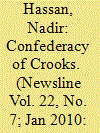

|
|
|
| 4 |
ID:
153289
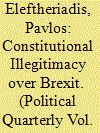

|
|
|
|
|
| Summary/Abstract |
Members and supporters of the British government say that the only constitutionally legitimate course of action over Brexit after the referendum is to press ahead with withdrawal from the European Union, even if that would entail the complete severance of all ties (which we normally call ‘hard Brexit’). A more sophisticated view of the constitution, however, shows that these more or less populist arguments are false. As the Supreme Court confirmed in the recent Gina Miller judgment, the constitution did not change with the June referendum. Parliament is still supreme and determines both ordinary legislation and constitutional change. In fact, if one examines closely the claim that the referendum entails hard Brexit, it becomes obvious that this claim is false as well. The referendum opened the door for one among four different possibilities. Which Brexit option—if any—the United Kingdom should take is a matter for Parliament now to decide, following the normal processes of democratic deliberation and representation.
|
|
|
|
|
|
|
|
|
|
|
|
|
|
|
|
| 5 |
ID:
127950
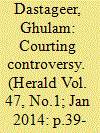

|
|
|
| 6 |
ID:
159755
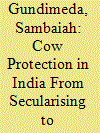

|
|
|
|
|
| Summary/Abstract |
Cow protection, a potent tool in the hands of cow vigilantes for atrocities against Muslims and Dalits, has become a heavily politicised issue in contemporary India. Its roots, connecting the themes of caste-Hindu religious sentiment, communalism and economic reasoning, can be traced to the late nineteenth century, though basic problems over the intriguingly complex use of cattle are clearly much older. This article relates contemporary cow protection debates specifically to Arya Samaj arguments against cow slaughter in the late nineteenth century and publication of a special issue of the journal Kalyan, titled Gau Ank, in 1945. The discussion shows how cow protection debates in the Constituent Assembly of India and in subsequent post-independence judicial verdicts were heavily influenced by these two earlier discourses. Analysing two landmark judicial decisions on cow slaughter, the article argues further that recent judicial endorsement of cow protection legitimises Hindu majoritarian sentiments in the law, while depriving millions of Indians, not just Muslims, of fundamental rights to food and livelihood. The conclusion attempts to consider some possible solutions to the current impasse.
|
|
|
|
|
|
|
|
|
|
|
|
|
|
|
|
| 7 |
ID:
113665
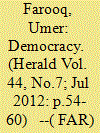

|
|
|
| 8 |
ID:
094331
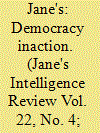

|
|
|
| 9 |
ID:
117130
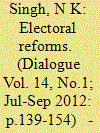

|
|
|
| 10 |
ID:
090249
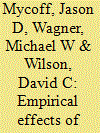

|
|
|
|
|
| Publication |
2009.
|
| Summary/Abstract |
The effect of voter-identification (voter-ID) laws on turnout is a hot-button issue in contemporary American politics. In April of 2008, the U.S. Supreme Court affirmed Indiana's voter-ID law, the nation's most rigorous, which requires voters to arrive at the polls with a state-issued photo ID containing an expiration date (Crawford v. Marion County 2008). In a famous incident highlighting how Hoosiers were dealing with their state's voter-ID law, representative Julia Carson (D-IN) was initially blocked from voting during Indiana's 2006 primary election for failing to comply with Indiana's voter-identification standard. Carson identified herself with her congressional ID card; since that card did not include an expiration date and therefore did not meet Indiana's voter-identification law, she was turned away at the polls before later being allowed to vote (Goldstein 2006). The rising wave of public, political, and legal debate crested two years later in the wake of the Supreme Court ruling and during the Indiana primaries, with reports of a dozen nuns being denied ballots at the polls due to their lack of appropriate identification (Urbina 2008).
|
|
|
|
|
|
|
|
|
|
|
|
|
|
|
|
| 11 |
ID:
122380


|
|
|
| 12 |
ID:
129456
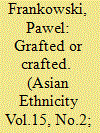

|
|
|
|
|
| Publication |
2014.
|
| Summary/Abstract |
This article documents and analyzes the limits of multinational federalism in East Africa and the diffusion of the East Asian model of integration. As the most advanced regional bloc in Africa, the East African Community is ideally suited to test different models of integration and federalism, especially those developed in Asia, and in particular by Malaysia. The article seeks to move beyond traditional explanations of relatively limited impact of external model of integration on African states, and proposes an alternative framework of analysis where external pressures and models are compared with more demanding expectations on the African side. Thus, the main aim of the article is to explore, and to compare, different theoretical perspectives and empirical examples of federalism in the two regions where working patterns of integration does not necessarily follow a Western style of integration (the EU) or federalism (Canada and the US).
|
|
|
|
|
|
|
|
|
|
|
|
|
|
|
|
| 13 |
ID:
104556
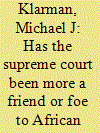

|
|
|
| 14 |
ID:
160391
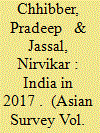

|
|
|
|
|
| Summary/Abstract |
The year 2017 saw the ruling Bharatiya Janata Party extend its electoral dominance by winning major state elections. The BJP was less successful, however, in containing contentious politics and vigilantism by right-wing groups. It was also a tumultuous year for the Indian economy as it strove to recover from the shock of major reforms. The Supreme Court issued landmark verdicts likely to have weighty implications for Indian society in the years to come. The Indian government could also claim credit for foreign policy successes vis-à-vis China, Pakistan, Israel, and the ICJ.
|
|
|
|
|
|
|
|
|
|
|
|
|
|
|
|
| 15 |
ID:
131195
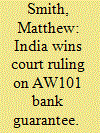

|
|
|
|
|
| Publication |
2014.
|
| Summary/Abstract |
Anglo-Italian helicopter manufacturer AgustaWestland will pay a Euro228 million (USD311 million) bank guarantee to the Indian government following a ruling by the Italian courts, it was announced on 23rd May
|
|
|
|
|
|
|
|
|
|
|
|
|
|
|
|
| 16 |
ID:
069795


|
|
|
| 17 |
ID:
141303


|
|
|
|
|
| Summary/Abstract |
BRUCE E. ALTSCHULER revisits the Pentagon Papers case to determine its relevance in the internet age. He argues that the emergence of independent leakers with access to the internet has shifted greater responsibility on the mainstream media to practice self-restraint and to decide what to publish. The emergence of independent leakers has also accelerated prosecutions by the Obama administration.
|
|
|
|
|
|
|
|
|
|
|
|
|
|
|
|
| 18 |
ID:
163291


|
|
|
|
|
| Summary/Abstract |
This article argues that the far-reaching changes in the jurisprudence of Israel’s Supreme Court during the 1980s and 1990s need to be understood in the context of the 1977 upheaval (or mahapach). This momentous event signalled the decline of the hegemony of the Labour movement that had led Israel for over four decades, as well as the resurgence of the ‘war of cultures’ (kulturkapmpf) that had been part of the history of the Jewish people since the rise of Jewish Enlightenment in the second half of the eighteenth century, namely the struggle between secular, pro-Western, liberal Jews and their religious counterparts over the nature and characteristics of Jewish public life. This article argues that the short time between the unprecedented developments in the jurisprudence of the Supreme Court and the mahapach invites an explanation that connects the two together.
|
|
|
|
|
|
|
|
|
|
|
|
|
|
|
|
| 19 |
ID:
106227
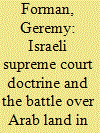

|
|
|
|
|
| Publication |
2011.
|
| Summary/Abstract |
In the mid-1950s, the overwhelmingly Arab central Galilee became the first regional focus of Israeli land-claiming in the context of state efforts to Judaize the region. This article examines the land-related judicial doctrines adopted by the Israeli Supreme Court through the early 1960s that facilitated this endeavor. While previous academic work on the evolution of these doctrines depicts a "horizontal" process proceeding from one SC precedent to another, this article employs a "vertical" approach that focuses on the role of litigant argument and lower-court rulings. The main finding is that in these disputes, SC justices did not merely rule in favor of the state, but consistently adopted the legal arguments advanced by the state, transforming them into SC doctrine and the law of the land.
|
|
|
|
|
|
|
|
|
|
|
|
|
|
|
|
| 20 |
ID:
111509


|
|
|
|
|
| Publication |
2012.
|
| Summary/Abstract |
This article deals with the judicialization of politics in Pakistan under the Supreme Court Chief Justice Choudhry (2009-). Confrontation between the executive and judiciary under him led to speculation about the imminent collapse of the democratic system, given the history of military take-over in the country. The use of judicial review, whereby the Court exercised the power of interpreting the Constitution with impunity, was widely criticized as an attempt to encroach on the territory of the legislature through case law. At the institutional level, the Court sought to exercise veto power over the appointment of judges and to deny the right of oversight to any government agency. The Court's pursuit of public interest litigation through frequent suo motu actions taken in a populist mode led to brinkmanship on the part of the executive and judiciary. Despite this power play, the Court's operations fell into the category of modus operandi, instead of being a fight to the finish. However, the Court's pursuit of judicial reform relating to cheap and speedy justice and accountability of the higher judiciary remained far from satisfactory.
|
|
|
|
|
|
|
|
|
|
|
|
|
|
|
|